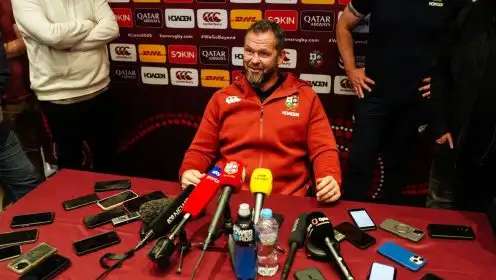Loose Pass: World Rugby’s ‘poster boy’ consistent failures and Red Bull’s takeover is no ‘landmark moment’

Paula Balekana for New England Free Jacks. (Image credit - Davey Wilson) and an inset of Newcastle head coach Steve Diamond (Image - Richard Sellers)
This week we will mostly be concerning ourselves with the challenges in the USA and the Red Bulls…
USA’s problems are also World Rugby’s
Three months ago all was, if not rosy, certainly gaining colour in the USA. World Rugby looking at its largest global market with positive intent. The end of a Major League Rugby season, which finished both with a fine finale and, most importantly for the bean-counters, a finale that wrote black numbers in the final analysis.
The finale did, but clearly the rest of it didn’t. Within two months, two of the eleven teams have merged, two others are gone. Both have said gone only for the coming season and have made positive sounds about the 2027 edition, but a league in which teams can simply pick and choose which seasons to play in does not feel stable. The league has understandably said that the teams must go through a ‘rigorous’ re-application process rather than just taking a sabbatical, but if the teams are dropping like flies and the threat to the league is existential… well, how rigorous will that process actually be?
The irony of Miami Sharks CEO Milagros Cubelli being voted rugby executive of the year and the same team folding two days later should not be lost on anyone, and more pain could follow, with Utah Warriors CEO Kimball Kjar confirming that the team was still ‘seeking new investment’, an oft-uttered phrase which more and more in rugby globally has come to resemble the strangled chirps of a canary suffocating in the coal-mine.
Should the Warriors down shields, that would reduce the number of teams to seven, the same number as in the pioneering league of the pre-covid era, with one of those teams fully-funded by World Rugby.
The governing body is yet to comment on the struggles of the pro game in a country which is the poster-boy for global expansion. In July however, World Rugby CEO Alan Gilpin told The Guardian that while he wanted MLR to be successful, he saw some form of cross-border competition – be it Super Rugby or the United Rugby Championship or some such – as possibly being a ‘really good addition’.
Perhaps it would be, but how far is that then removed from the R360 concept currently gaining pre-contract signatures and disrupting almost everything in theory as it attempts to hijack the rugby world? And more importantly, if it zeroes in on the USA and helps make rugby a success, how much power does World Rugby have to ensure that the entire traditional fabric of the game below international level is not ripped up for good? World Rugby is so invested in the USA right now as a result of the 2031 World Cup that you feel the governing body might take any help to Major League Rugby on offer.
Not a good look, not a good situation. Not any of it. An entire sport continues to exist on cheques written by others, consistently failing to build up a decent bank balance of its own. Its soul is closer to a sale.
Eddie Jones backs Springboks ace to win 100m sprint ‘by five metres’
As if to prove a point
Not that this column is in any way dissatisfied that Newcastle was saved as opposed to going to the wall, but that the Newcastle Red Bulls will be stampeding through the Premiership next season still doesn’t quite ring right either.
For example, this soundbite from Premier Rugby CEO Simon Massie-Taylor: “Red Bull’s takeover of Newcastle is a landmark moment for our sport and a powerful endorsement of our vision and strategy for the future of the Gallagher Prem” contains a few aspects that illustrate the difference between rugby as we know/knew it and rugby as the promoters would want/know it.
A ‘landmark moment’? A Landmark moment would be the culmination of the development of a fully professional second tier in order to provide competition to the first tier and expand sustainably the top-level player base in England, not the purchase for a few quid of a club that otherwise faced oblivion.
A powerful endorsement of the vision and strategy would be sponsorship of an entire league in which well-balanced cost-revenue flows ensured all clubs were breaking even and fielding competitive teams each week, not the isolated rescue of the weakest club by a corporate-branding behemoth seeking to tunnel its way into a position of power in yet another sport.
It’s good news for Newcastle. It’s a welcome boost for Steve Diamond, whose retention in his role is a just reward for the years he’s been battling to keep the team respectable on a fraction of the resources of his counterparts. It’s a reprieve for English club rugby. But a landmark moment it is absolutely not.
READ MORE: Steve Diamond on replicating ‘Galacticos’ Bath journey following new influx of cash



